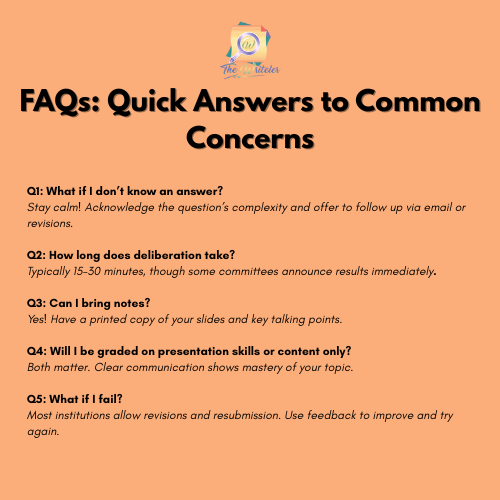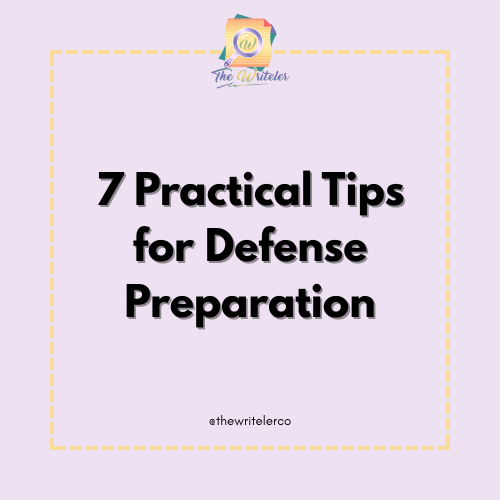A thesis defense can feel like stepping into the unknown, but understanding the process can turn uncertainty into confidence. This guide breaks down what to expect during your defense , from the moment you walk into the room (or log in virtually) to the final verdict. Whether you’re defending a master’s thesis, dissertation, or capstone project, these insights will help you navigate every stage with clarity and poise.
1. The Structure of a Thesis Defense
Most defenses follow a predictable format, though specifics vary by institution. Here’s a general breakdown:
A. Opening Remarks (5–10 minutes)
- Chairperson’s introduction: The committee chair will outline the process and rules.
- Your introduction: Briefly introduce yourself and your research topic.
- Advisor’s role: Your advisor may provide context or highlight your contributions.
B. Presentation (20–40 minutes)
- Overview of your work: Summarize your research question, methodology, findings, and conclusions.
- Visual aids: Use slides, diagrams, or videos to clarify complex concepts.
- Time limits: Stick to your allotted time—committees often penalize overruns.
C. Q&A Session (30–60 minutes)
- Committee questions: Members will probe your methodology, assumptions, limitations, and implications.
- Follow-up discussions: Deeper dives into specific aspects of your work.
- Constructive criticism: Feedback on areas needing refinement.
D. Deliberation and Results
- Private discussion: The committee deliberates on your performance.
- Outcome announcement: Possible results include passing outright, conditional approval (with revisions), or requests for major changes.
2. Who’s on the Committee—and What They Want
Your committee typically includes:
- Primary advisor: Your mentor, who knows your work intimately.
- Subject matter experts: Scholars familiar with your field’s methodologies.
- External members: Neutral evaluators ensuring academic rigor.
What They’re Looking For:
- Clarity of thought: Can you articulate your research’s purpose and impact?
- Critical thinking: How do you defend your choices or acknowledge gaps?
- Originality: Does your work contribute meaningfully to the field?
- Professionalism: Are you respectful, prepared, and engaged?
3. Common Questions to Expect
Committees often ask variations of these:
- “What’s the significance of your research?”
- “Why did you choose this methodology?”
- “How do your findings compare to existing literature?”
- “What are the limitations of your study?”
- “What future research would you suggest?”
Pro Tip: Prepare “elevator pitches” for each of your top 5 anticipated questions.
4. Emotional Rollercoaster: Navigating Stress and Confidence
It’s normal to feel overwhelmed, but here’s how to stay grounded:
Before the Defense
- Acknowledge nerves: Even seasoned researchers get anxious!
- Visualize success: Picture yourself answering questions confidently.
During the Defense
- Pause before answering: Take 2–3 seconds to gather your thoughts.
- Lean into passion: Share your enthusiasm for the topic—it’s contagious!
- Embrace imperfection: Committees prioritize substance over flawless delivery.
After the Defense
- Celebrate small wins: Even if revisions are needed, you’ve made progress!
- Process feedback: Reflect on critiques without taking them personally.
5. Real Talk: Surprises and Challenges
Here’s what they don’t always warn you about:
A. Unpredictable Questions
- Curveballs: A committee member might ask about tangential topics.
- Solution: Stay calm, restate the question to clarify, and address it step-by-step.
B. Committee Dynamics
- Debates among members: They may disagree on feedback.
- Solution: Stay neutral and thank them for their perspectives.
C. Technical Glitches
- Slide failures: Practice presenting without visuals as a backup.
- Solution: Keep a printed copy of your script or key points.
6. Post-Defense: Next Steps
Once the verdict is in, here’s what to do:
- Immediate actions:
- Take notes on required revisions.
- Thank the committee politely.
- If revisions are needed:
- Create a timeline to complete changes.
- Schedule a follow-up meeting with your advisor.
- If you pass:
- Submit final documents as instructed.
- Celebrate your achievement!
7. Expert Tips for Success
- Practice in the venue: Familiarize yourself with the room or virtual platform.
- Dress professionally: Business attire signals respect and boosts confidence.
- Bring materials: Have a printed thesis, notes, and water nearby.
- Engage, don’t recite: Treat the session as a scholarly conversation.
Final Thoughts
Your thesis defense isn’t a test of perfection—it’s a celebration of your growth as a scholar. By understanding the structure, anticipating questions, and embracing the emotional highs and lows, you’ll approach the process with clarity and confidence. Remember: Committees want you to succeed. They’re not looking for flawless answers; they’re seeking evidence of critical thinking, dedication, and intellectual curiosity. You’ve done the work—now go show them what you’re capable of!

Let The Writeler Co. support you in achieving academic and professional excellence! Whether you need assistance with research writing, proofreading, editing, or data analysis, our expert team is here to help.
📩 Email us today or 📲 message us on our Facebook account to get started. Let’s make your work shine!





0 Comments